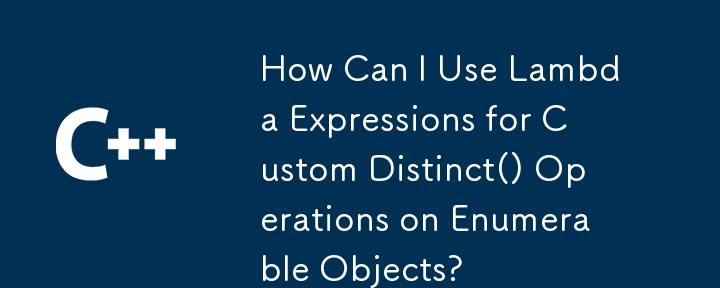

Use Lambda expressions to customize the Distinct() operation
When dealing with enumerable objects, the Distinct() method provides a direct way to remove duplicate values. However, for objects that require custom equality checks, the existing Distinct() overloaded methods are not ideal.
One might expect an overloaded method that accepts a Lambda expression to define equality, for example:
<code class="language-c#">var distinctValues = myCustomerList.Distinct((c1, c2) => c1.CustomerId == c2.CustomerId);</code>
However, such overloaded methods do not exist in native methods. Instead, IEqualityComparer<T> instances must be used, which can be lengthy and cumbersome.
Alternatives
To achieve the desired functionality, you can combine the GroupBy() and Select() methods:
<code class="language-c#">IEnumerable<Customer> filteredList = originalList .GroupBy(customer => customer.CustomerId) .Select(group => group.First());</code>
This method identifies and groups items based on the CustomerId field. The First() method then selects the first item from each group, effectively removing duplicates.
The above is the detailed content of How Can I Use Lambda Expressions for Custom Distinct() Operations on Enumerable Objects?. For more information, please follow other related articles on the PHP Chinese website!
 SpringBoot project building steps
SpringBoot project building steps
 What are the css3 gradient properties?
What are the css3 gradient properties?
 Usage of fopen function in Matlab
Usage of fopen function in Matlab
 How to solve the problem that the msxml6.dll file is missing
How to solve the problem that the msxml6.dll file is missing
 How to use the large function
How to use the large function
 Three major frameworks for android development
Three major frameworks for android development
 Word page number starts from the third page as 1 tutorial
Word page number starts from the third page as 1 tutorial
 Three major characteristics of java
Three major characteristics of java




